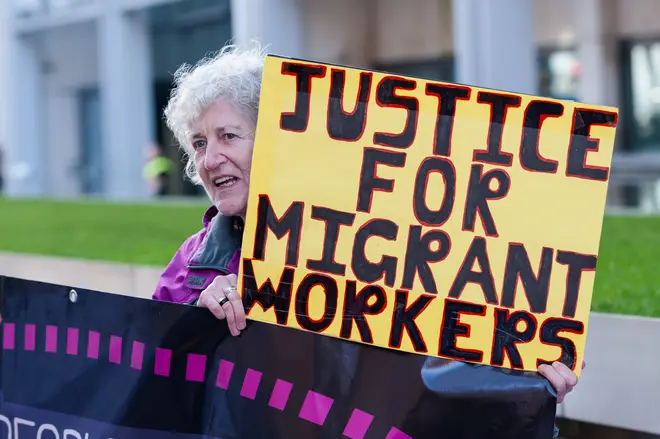
Matthew Wright 7am - 10am
18 February 2020, 22:45

The Home Secretary has said it is "right" that people should speak English before moving to work in the UK.
On a visit to Imperial College in London on Tuesday, Ms Patel said the new system would ensure that immigration policy is back under the control of the Government for the "first time in decades".
Speaking ahead of an announcement on the Government's new points-based immigration system, Priti Patel said those seeking to come to the country should also have a sponsored route either through employment or an offer from an academic institution.
The government will outlining plans for a new points-based system after freedom of movement ends said the economy needs to move away from a reliance on "cheap labour from Europe".
The changes are designed to cut the number of low-skilled migrants entering Britain from the beginning of next year but aim to make it easier for higher-skilled workers to get UK visas.
However, the government came under fire for telling employers they will "need to adjust" after deciding it will not offer visas to low-skilled migrant workers after Brexit.
Industry leaders have also warned that changes to the UK's immigration rules could "spell absolute disaster" for the care system and risk farmers, builders and hospitality businesses.
Ms Patel said: "On January 1 2021, we'll be ending the free movement of labour from the EU, but excitingly this will be our new system, an immigration system that enables the Government to take back control of our own immigration policy for the first time in decades.
"It will mean that we will have a global immigration system that doesn't discriminate between EU and non-EU, and it'll basically mean that the brightest and the best will be able to come to the United Kingdom to bring their real talents which we'll recognise through a points-based system."

Asked whether individuals who have an offer from an academic institution, but cannot speak English, would still be able to come to the UK, Ms Patel said: "We're being very clear about this, it is a system that puts the British Government in control of its immigration policy for the first time in decades.
"And yes, it is right that people should speak English before they come to our country, that they should have a sponsored route, whether it's through employment or a sponsored route through an academic institution."
Asked what assurances could be given to those already living in the UK who do not meet the thresholds outlined, Ms Patel said: "Well, I think first and foremost we have a number of routes and importantly we have the EU Settlement Scheme.
The Home Secretary also said discussions had been held with the devolved administrations.
"Of course this is a system for the whole of the United Kingdom," she said.
"There's been discussions taking place across the whole of government for a number of months and, in fact, even prior to the general election there'd been discussions taking place across all government departments and the devolved administrations."
The "firm and fair" system will instead "attract the high-skilled workers we need to contribute to our economy, our communities and our public services", according to the policy paper published on Tuesday evening.
But it added: "We will not introduce a general low-skilled or temporary work route.
"We need to shift the focus of our economy away from a reliance on cheap labour from Europe and instead concentrate on investment in technology and automation.
"Employers will need to adjust."

The new system is designed to cut the number of low-skilled migrants entering Britain from the beginning of next year but aim to make it easier for higher-skilled workers to get UK visas.
The Confederation of British Industry (CBI) warned care, construction, hospitality, food and drink companies could be most affected by the changes.
Industry leaders hit out at the lack of provision for low-paid workers in the proposals while lawyers urged the Government "not to turn the tap off overnight" if companies struggle to recruit staff under the new system.
Unison assistant general secretary Christina McAnea said the plans "spell absolute disaster for the care sector".
The UK Homecare Association said it was "dismayed" by the Government's decision, adding: "Cutting off the supply of prospective careworkers under a new migration system will pave the way for more people waiting unnecessarily in hospital or going without care.
"Telling employers to adjust, in a grossly underfunded care system, is simply irresponsible."
National Farmers' Union president Minette Batters expressed "serious concerns" about the Government's "failure to recognise British food and farming's needs" in the proposals.
The EU Settlement Scheme, designed to give EU citizens permission to stay and work in the UK after Brexit, will "provide employers with flexibility to meet labour market demands", the paper said.
Expanding a seasonal workers scheme and arrangements with eight countries to welcome young people to the UK will also help employers but they are expected to take "other measures to address shortages", the paper said.
Employers have until January 1 2021 to meet the requirements and ensure their staff have a right to work in the UK.
The plans will see the UK have "full control over who comes to this country" for the "first time in decades", according to the paper.
EU and non-EU citizens will be treated equally with criminal background checks carried out on everyone coming to the UK - affecting applications of anyone who has been given a prison sentence of 12 months or more.
People who want to live and work in the UK will need to gain 70 points to be eligible to apply for a visa.
Points will be awarded for key requirements like being able to speak English to a certain level, having a job offer from an approved employer, and meeting a minimum salary threshold.
"Top priority" will be given to those with "the highest skills and the greatest talents", like scientists, engineers and academics - who may not need a job offer to be allowed in.
Other points will be awarded for certain qualifications and if there is a shortage in a particular occupation.